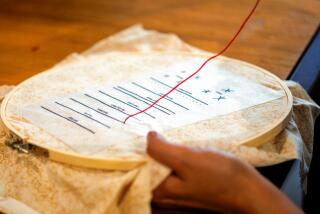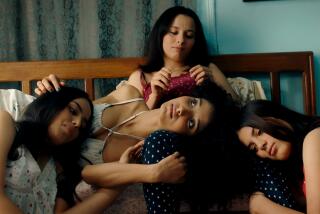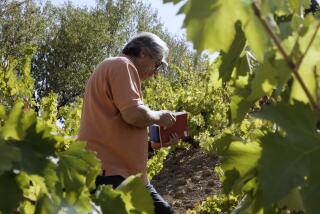Changing lives, one glass at a time
Marrakech, Morocco — RESEARCHING a recent Her World column on traveling in places struggling with poverty, I discovered Global Exchange Reality Tours, a San Francisco company that tries to expose travelers to the daily lives of people in the developing world.
Director Malia Everette told me that visitors from wealthy places, including North America, are often deeply moved when they meet the poorest of the poor and that they begin to understand their struggles.
I must confess that, at the time, the cynic in me wondered how many travelers would choose a trip to Chiapas, Mexico, to study the effects of the North American Free Trade Agreement instead of a week at the beaches of Cozumel.
But then I visited a small glass studio outside Marrakech where Dorine Herbecq, a Dutch expatriate, is helping poor Moroccan women change their lives by giving them the chance to work. The experience will stick with me long after I’ve forgotten the city’s beautiful mosques and enticing souks.
Marrakech, which has about 1 million residents, is in the middle of a growth spurt; buildings are rising seemingly everywhere, especially outside the medina, or old town. A traveler can’t help but appreciate the developments, which are largely the result of the burgeoning second-home market and the influx of business capital from Europe, encouraged by King Mohammed VI, who took the Moroccan throne in 1999.
It’s hard to determine how much the people of Marrakech -- especially the poor -- have benefited from the city’s striking transformation. Communal toilets are fixtures in certain quarters of the medina. People still scratch out a living by collecting stale bread. One night, I passed a man battering a woman on the head and shoulders in a dimly illuminated alley. My companion, a European who lives in Marrakech, spoke sharply to the man, then ruefully told me that wife-beating was still perceived to be a husband’s right in Morocco.
And that’s in the rapidly modernizing city. In the countryside, women live as they did in the Middle Ages, Herbecq, the founder of Atelier Beldine, told me.
I suspect you can gauge the true economic and spiritual success of a community by whether its women thrive. As a traveler in the developing world, I have seen women doing the meanest, lowest-paid jobs, if they’re allowed to work at all.
Studies sponsored by the U.N. Development Fund for Women (UNIFEM) have shown that women in the developing world are far less likely to hold regular paying jobs than men, laboring instead in catch-as-catch-can jobs, without benefits or enough income to keep them and their families out of poverty.
But letting women work is a key to general economic development. So in India, Jordan and many other countries, UNIFEM has encouraged projects to give women the life-changing chance to work, a right many of us from more fortunate countries take for granted.
No one encouraged Herbecq to find a way to employ 10 women who had rarely been out of their houses before going to work for Atelier Beldine.
“We are absolutely not a part of anything,” she said. “This is just a little project. The glass we make has to sell without help from anybody.”
I heard about her from the owners of a guesthouse in the medina who served me espresso in handsome, orange-banded demitasse cups that Herbecq had designed. I called and arranged to accompany her to her workshop in the village of Tamesloht, about 15 miles south of the city.
Herbecq picked me up in her dusty gray van at the front gate of the elegant La Mamounia hotel, and I began to learn her story.
She was born in Casablanca, of Dutch parents, although the family moved back to Northern Europe when she was a child. Later, she worked at Christie’s auction house in Paris and married Jean Martin, a Frenchman who made a successful career in event planning.
On a business trip about five years ago, he called her from Morocco and said he wouldn’t mind living there. She said, “Let’s go.”
Now, Martin is developing an eco-resort in the foothills of the Atlas Mountains and organizing the Marrakech Film Festival. Their four children go to school in town, and Herbecq would be your average soccer mom if it weren’t for her atelier, or workshop, in Tamesloht.
When we got there, men, women and children stopped by Herbecq’s open window to say hello. In the muddy courtyard of the atelier, we were greeted by a Moroccan toddler wearing big yellow Donald Duck slippers and -- far more unusual for a village child -- eyeglasses.
In that sun-baked town, with no apparent resources besides its Friday souk, Herbecq has almost single-handedly rescued Beldi glass, a popular Moroccan folk craft almost extinguished by cheap imports from China. She remembered Beldi glasses, which have a distinctive bulging ring near the rim, from her childhood. But when her family returned to Morocco, she couldn’t find them in the souks.
She uncovered the last company still producing the glasses, north of Casablanca, bought some and began experimenting with embellishments. She discovered she could make the designs permanent by using French paints and a kiln.
Some of her decorations are traditionally inspired and abstract, others whimsical cartoons of Moroccan life such as a white-robed man on a donkey, with bags of oranges hanging at its haunches.
In a long, low room adjacent to her office, I got to see the women at work, around a table covered with Beldi glasses and pots of paint. The women, ranging from about 15 to 35 years old, do not wear veils in the workshop. They finish about 30 glasses each in a six-hour day. When they have a deadline for a big order, they decide themselves whether to work overtime. Their salaries are large enough to support a small family, Herbecq said, but must not be bigger than those of their husbands and fathers to avoid upset in traditional, male-dominated households.
“I’m not here to change anything,” she said. “I just want to help them earn money because that makes them free. They are more respected in their families and villages because they work.”
Over the worktable, she and her employees have wide-ranging discussions. One needed help deciding whether to leave her husband. Another didn’t know whether to confront a schoolmate over a stolen backpack. When the workers started a women’s association in Tamesloht, which aims to open a public library, Herbecq advised them.
“We talk about everything -- my life, their lives, the things they see on television,” she said. “They all see shows like ‘Dallas’ and have very wrong ideas about Europe and America.”
I bought some Beldi glasses, my favorite souvenir of Marrakech. Priced at about $3 each, they clearly aren’t making Herbecq wealthy. But she said she didn’t start the atelier to make money. Why, then?
“When you’re in a country like this one, it’s difficult to be blind,” she said from behind her plywood desk. Then she looked up and smiled. “I really love this country.”
Susan Spano also writes “Postcards From Paris,” which can be read at latimes.com/susanspano.
More to Read
Sign up for The Wild
We’ll help you find the best places to hike, bike and run, as well as the perfect silent spots for meditation and yoga.
You may occasionally receive promotional content from the Los Angeles Times.






